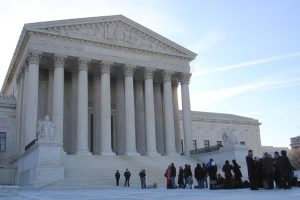Supreme Court Will Hear Arguments in FSC’s Texas Case on Jan 15, 2025
 WASHINGTON, D.C. – The Free Speech Coalition (FSC) announced Thursday that the U.S. Supreme Court has scheduled oral arguments in Free Speech Coalition v Paxton, the FSC’s challenge to H.B. 1181, Texas’ age-verification law, for January 15, 2025.
WASHINGTON, D.C. – The Free Speech Coalition (FSC) announced Thursday that the U.S. Supreme Court has scheduled oral arguments in Free Speech Coalition v Paxton, the FSC’s challenge to H.B. 1181, Texas’ age-verification law, for January 15, 2025.
As noted in the FSC’s statement, the Court accepted the case, granting FSC’s petition for certiorari, in July. FSC filed its merits brief in September. FSC and the organization’s co-plaintiffs are represented by the American Civil Liberties Union (ACLU) and Quinn Emmanuel Urquhart & Sullivan, LLP.
In its merits brief, FSC asserted that “H.B. 1181’s age-verification requirement is unconstitutional under a straightforward application of First Amendment principles and precedent. The preliminary injunction should accordingly be restored.”
FSC added in the brief that when speech is protected by the First Amendment, “a content-based burden on that speech triggers strict scrutiny.”
“H.B. 1181’s age-verification requirement fits squarely within that rule,” FSC argued. “The age verification requirement is triggered by speech that Texas has deemed inappropriate for minors but that is constitutionally protected for adults. It is facially content-based, applying only to specified sexual material. And it imposes a clear burden, forcing adult users to incur severe privacy and security risks – which the statute leaves largely unaddressed – before they can access constitutionally protected speech.”
FSC further argued that “basic principles of free speech thus call for strict scrutiny.”
“And this Court’s precedent removes all doubt,” FSC added. “In an unbroken line of cases dating back decades, the Court has uniformly applied strict scrutiny to laws that do what H.B. 1181 does –burden adults’ access to non-obscene sexual content, which is constitutionally protected for them, while attempting to restrict minors’ access to that content. That line of cases culminated in Ashcroft, in which eight Justices applied strict scrutiny to a law materially indistinguishable from H.B. 1181.”
FSC Executive Director Alison Boden said that while Texas’ law “may sound reasonable on its face, in practice, it is extraordinarily burdensome and invasive, effectively deterring adults from accessing legal content.”
“To make matters worse, this law – and ones like it – fail at their stated goal of protecting children online, despite forcing adult content creators and consumers to operate under the threat of surveillance and censorship,” Boden added. “We look forward to making our case before the Court.”
You can read the full text of the FSC’s merits brief here.
Supreme Court image by David Lat













